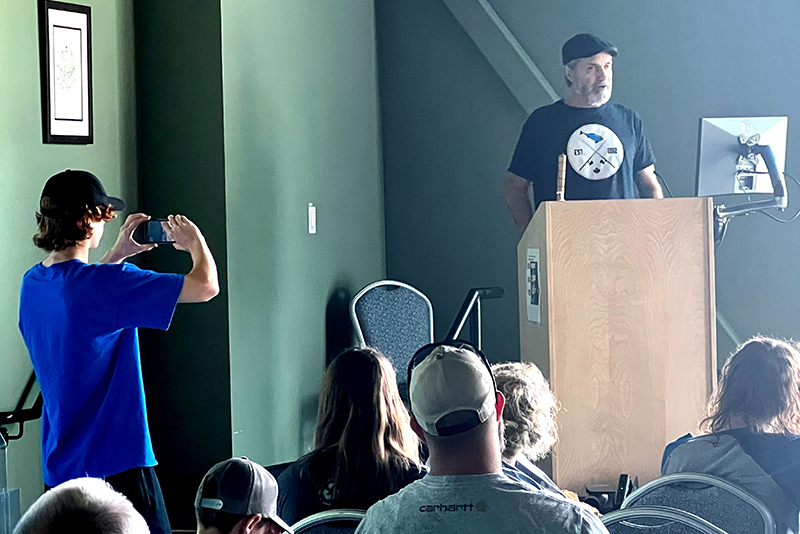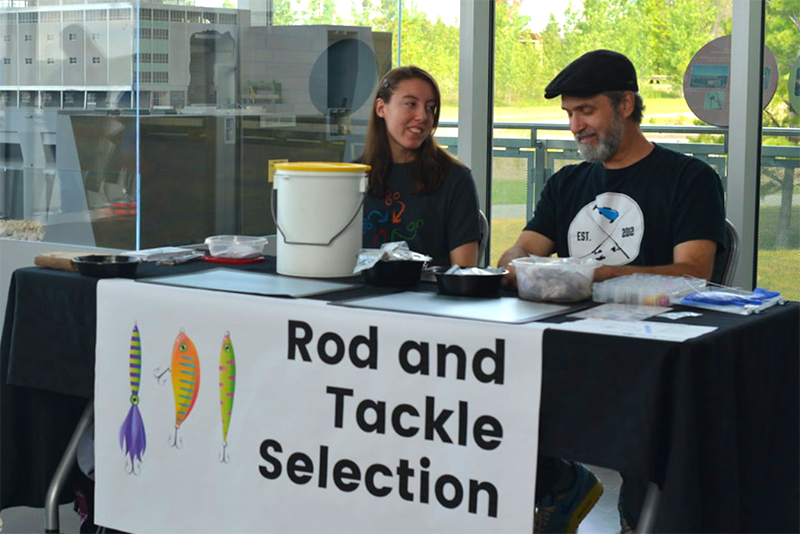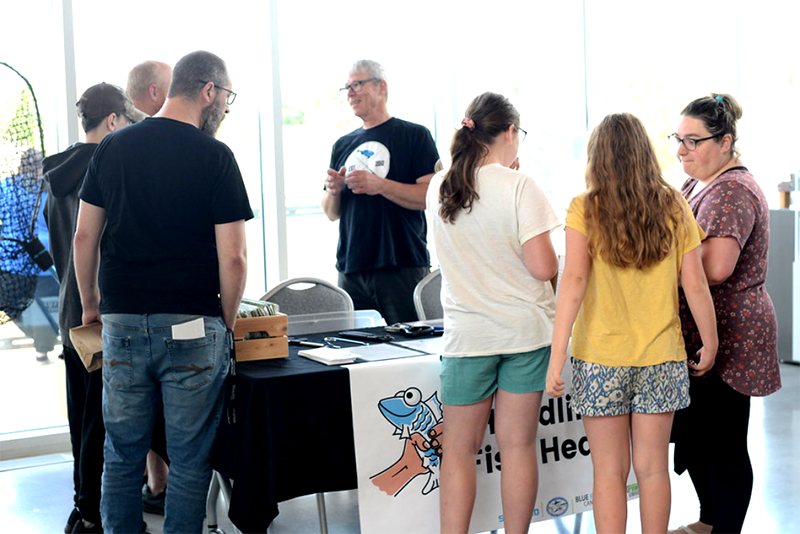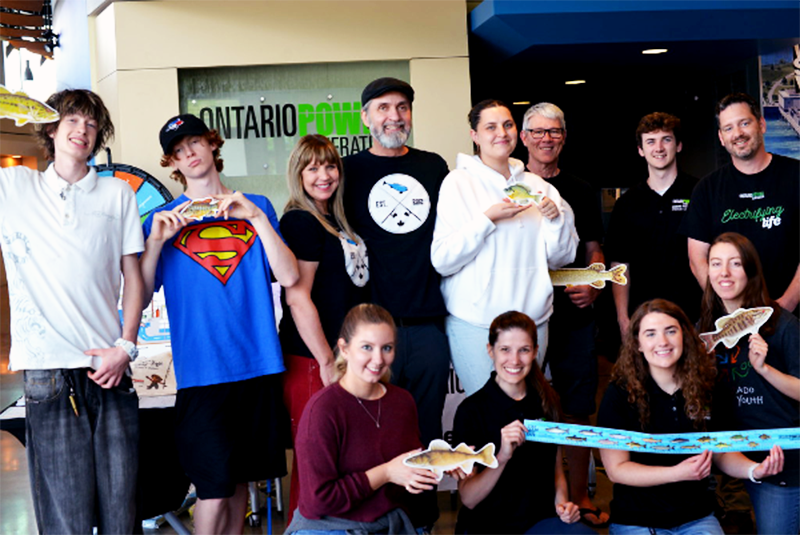Blue Fish News – June 19, 2023
What’s new at Blue Fish Canada: Our Get Ready for Fishing program was a huge success in Cornwall with over 165 youth and family members participating from a wide cross-section of the population. Next up, it’s the Akwesasne youth fishing at Mallorytown Landing on the St. Lawrence River. Blue Fish Canada has staff, volunteers, equipment, great sponsors like Shimano, the IGFA and Eagle Claw, and an ever-increasing demand for our Get Ready to Fish program!
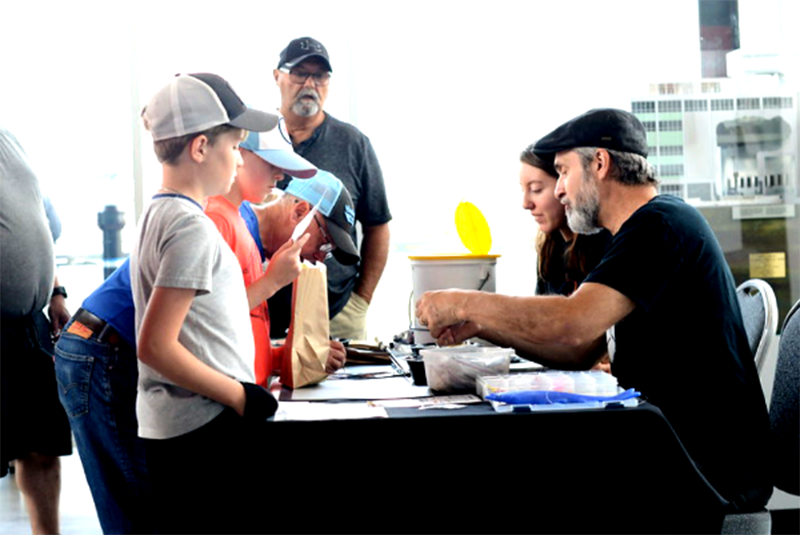
This Week’s Feature – Get Ready for Fishing
We recently held another of our highly popular “Get Ready for Fishing” events and the feedback was amazing as usual. What made this event particularly unique though, was the diversity of participants – all of whom share a strong interest in learning to fish.
Blue Fish Canada decided over a decade ago that our mission was to inform youth and their mentors how to fish sustainably. Not just how to catch fish, but to make sure the fish they were intending to harvest were the right species, size, number, health and time of year. And, for those fish that are to be returned, tips for making sure they go back healthy. This is where our programs start.
Blue Fish Canada organizes Get Ready for Fishing events to reach out to those interested in enriching their lives through the act of fishing, and who want to make sure that their actions are sustainable. Not all will become active stewards, but through our resources and program offerings, they will all gain a basic understanding of the different role’s citizen scientists can take to make sure fishes and their habitat are protected for future anglers to experience.
Blue fish programs shepherd youth in their pursuit of becoming a steward of the resource by building on their understanding of citizen science. More specifically, how anglers can strengthen and safeguard fish habitat, identify and rectify fish health issues, strengthen resilience of watersheds and water quality, prevent and remove invasive species, reverse and prevent coastal and shoreline wetland loss, monitor and measure fish abundance and movement, and observe fish behavior and reactions to changes in their environment. There’s more, but the fact is all good anglers practice many if not most of the above.
Attendance at the Get Ready for Fishing event last weekend included people from around the world who have come to Canada to begin a new life. It included people who have been here for thousands of years, and whose connection with nature has been interrupted and who are now looking to take up fishing once again. It included multi-generation families and elders who are hoping to kindle in their descendants the love for fishing that they themselves developed as a child. It included experienced anglers who understand that fishing best practices are evolving as scientific research is blended with local and traditional knowledge. But mostly, it included youth interested in learning to fish. Over 165 people came through the doors of the Ontario Power Generation Visitors Centre in Cornwall that day.
Anglers make up the largest group of citizens who venture into the outdoors to practice their cultural and social practices that support so many communities across Canada. The same can be said for indigenous fishers. What separates these anglers and fishers from those who are involved with commercial fishing is that they do it to feed their families and communities, to take a break from the pressures of life, and to connect with nature. They also fish to celebrate life and to enhance social gatherings by sharing their catch with others. And yes, there are those who do it for sport as well, which in reality is a small step towards fishing commercially in that tournament anglers and guides all hope to make money through fishing. However, unlike those who catch fish to sell, sport fishers often release the fish they catch.
There are some who believe that fishing is nothing more than an act that causes injury and pain to fishes. A child who explores shorelines on their own may inadvertently cause fish to suffer, but it’s unlikely that they are mature enough to understand the consequences of their actions. They either discover these unintended consequences as they gain greater awareness of the world around them, or hopefully sooner by means of a more experienced angler or fisher who takes the time to pass on the knowledge and skills to fish responsibly. It’s why we engage both youth and their mentors in Blue Fish programs.
A big thanks to OPG for hosting the event, to the folks at the International Game Fish Association for providing Blue Fish Canada with an incredible variety of resource materials, to the invasive Species Centre for supporting our development of angler-specific awareness tools, to Shimano for donating the rods and reels that we gave away to several lucky attendees, and to Eagle Claw for the thousands of barbless and circle hooks and lead-free weights that we gave away. And most importantly, thanks to the many volunteers and summer youth employees that came out on a beautiful Saturday to support the event.
The Latest Fishing, Fish Health and Fish Habitat News
Fishing:
Free Fishing for Fathers Day Weekend / BayToday.ca
Ontario’s Ministry of Natural Resources and Forestry has declared Father’s Day as a weekend of free fishing, no license required. To celebrate Canada Day next month, you can also fish for free during Family Fishing Week in Ontario (July 1-9). Approximately 1.2 million licensed anglers spend $1.75 billion each year on recreational fishing in Ontario.
Biologist restores streams, spends downtime fishing in them / CollingwoodToday.ca
Nottawasaga Valley Conservation Authority (NVCA) stewardship manager, Fred Dobbs, will lead a workshop at Bass Pro Shops Cabela’s Barrie this weekend called ‘learn to fly-fish like a biologist’. The last time he did a similar workshop in spring, a week before trout season, Dobbs said he received overwhelmingly positive feedback. It also helps that workshops based on hobbies such as fly-fishing open up opportunities for conversations about the restoration of rivers, and volunteering for restoration projects Learn to flyfish Tickets, Sat, Jun 17, 2023 at 11:00 AM | Eventbrite
Barbless Benefits / Ontario Out of Doors
There’s been a lot of research on the impacts of hook barbs on fish stress, injury, and mortality in a catch-and-release context. Ontario Federation of Anglers & Hunters (OFAH) Fisheries Biologist Adam Weir says “there is considerable evidence that caught-and-released fish, when handled appropriately, survive with minimal sub-lethal effects.” However, barbless hooks also make fishing safer for those new to fishing. Barbless is the way to go for beginners practicing casting and learning proper fish handling and hook removal techniques.
The Fishing Report – Early Open-Water / Hunt Fish Manitoba
With another winter in the books and the long-awaited spring well under way, anglers have been all over the province taking advantage of the warm weather and that world-class fishing opportunities it brings. Whether you’re looking to get on the boat or simply fishing off shore, check out these hot bites you don’t want to miss as things continue to heat up!
Kids Can Catch Fort Saskatchewan / ASA
On June 10, the Alberta Conservation Association had our Fort Saskatchewan Kids Can Catch event. The event saw over 400 participants, many trying fishing for the first time! Thank you again to all of our volunteers, sponsors, and partners. Without your support and contributions, events like this couldn’t happen. There are plenty more Kids Can Catch events happening throughout Alberta this summer.
Youth Conservation Leadership & Mentoring Project SkeenaWild
Building on the strong foundation of the SkeenaWild Education Program, SkeenaWild is developing a new program that adheres to our education mandate of inspiring and educating the next generation of conservationists by developing and implementing the SkeenaWild Youth Conservation Leadership and Mentoring Project for youth ages 12 to 16 years old.
U.S. Federal Legislation Introduced to Take Kids Fishing / ASA
The bill would create a grant program within the National Oceanic and Atmospheric Administration (NOAA) for projects that take children fishing in the ocean or Great Lakes, with priority given to projects that serve underserved communities. This legislation is in line with the American Sportfishing Association’s (ASA’s) goal of introducing new anglers – particularly young people – to recreational fishing.
Fish:
40th Annual Meeting of the North Atlantic Salmon Conservation Organization (NASCO) / Fisheries and Ocean Canada
The number of wild Atlantic salmon in Canadian and international waters has steadily declined since the mid-1980s. Increased collaboration across borders, taking into account the best available scientific information, as well as Indigenous perspectives and leadership, is crucial to the long term conservation and restoration of the species.
Skeena and North Coast Fisheries Outlook 2023 / SkeenaWild
Watch SkeenaWild’s Executive Director, Greg Knox, as he provides a brief overview of the preliminary outlook for fisheries and salmon returns to the north coast for the upcoming 2023 season.
La Renaissance students help restock fish into local waterways / North Bay Nugget
The students at Ecole secondaire catholique La Renaissance have been participating in the micro-hatchery program at their school for the last seven years, under the tutelage of Rolly Frappier, owner of Micro-Hatcheries. As part of their science lessons the students discover the importance of ecosystems and how to properly maintain the micro-hatchery. They also learn about chemistry by determining the proper pH balance to keep the fish alive and thriving; physics with regulating the pressures of the system to improve water circulation; and biology with the study of the anatomy and development of the fish.
Whale-watching in Canada: Where to spot them — and when / CBC
With 35 species of whales — nine baleen whales and 26 toothed species — frequenting our waters, Canada is one of the best places on earth to spot the world’s largest mammals, and summer is peak season for whale-watching in coastal communities from Newfoundland to Vancouver Island.
Habitat:
Canada launches $36.6 million aquatic invasive species fund / canada.ca
The Canadian government has pledged to invest $36.6 million over five years to fight aquatic invasive species. The AISPF aims to strengthen partnerships between the federal government, provinces and territories, Indigenous communities, stakeholders and the general public. These partnerships will facilitate on-the-ground, preventative actions against aquatic invasive species as well as education, outreach, detection and response activities.
Almost 3 million salmon migrated past the Big Bar slide area in 2022 / My Cariboo Now
Work at the Big Bar Landslide north of Lillooet is entering its fourth year.
Canada Proposes Regulations on PFAS Fire Fighting Foam / Canada Gazette
Canadian health and environmental agencies listed over 4700 PFAS chemicals as toxic under the Canadian Environmental Protection Act (CEPA). Now that the chemicals are listed as toxic, the federal government can propose regulations. PFAS are a family of synthetic compounds called “forever chemicals” because they are extremely persistent in the environment and can accumulate in human blood. They are also linked to health conditions such as cancer. The Canadian government is currently considering restricting some PFAS, such as fire-fighting foam, but unfortunately, not for consumer products.
Zebra mussel caught hitching ride / Ontario Out of Doors
One of Canada’s most notorious invasive species may have just found a new way to get around: on fish. Now that live fish are a potential vector for the spread of zebra mussels, the already harmful practice of bait-dumping has even more potential for ecological destruction.
Government of Canada invests to protect species at risk in the Greater Montréal area / Cision Newswire (CNW)
Canada’s Minister of Environment and Climate Change announced $400,000 in funding for a four-year project led by Éco-Nature in the Greater Montréal area. This project aims to protect and restore the habitats needed by a dozen species at risk, including the Snapping Turtle, Least Bittern and American Water-willow. The project will take place on diversified, interconnected sites close to the Parc de la Rivière-des-Mille-Îles.
Indigenous:
Industry, conservationists welcome Ottawa’s delay on B.C. salmon farm transition plan / CBC
Bob Chamberlin, a spokesperson for B.C.’s First Nation Wild Salmon Alliance, which represents about 100 Indigenous nations opposed to the open-net fish farms, said the extension period should provide more time to build their case to support wild salmon.
Communities band together to save the river that sustains them / National Observer
The program will restore degraded habitat along the sc̓e:ɬxʷəy̓əm that is home to numerous species at risk, such as Pacific salmon. The restoration work involves removing non-native species, replanting endemic plant species, stabilizing the banks along the river to prevent erosion and creating off-channel habitat made up of streams and wetlands that connect to the sc̓e:ɬxʷəy̓əm (Salmon River).
Boating:
Proposal for the Boating Safety Contribution Program / GOC
Transport Canada is committed to promoting safe boating practices on these waterways, with the goal of reducing preventable incidents, including drowning and property damage. The programs objectives are : Increasing the number of pleasure craft and small vessel operators following safe boating practices; Improving access to national boating incident data that will improve stakeholder’s capacity to deliver evidence-based awareness and education initiatives; and Helping reduce deaths, injuries, and property damages due to boating accidents.
Education:
Aquatic Sciences – Digital learning kit / Canada Science and Technology Museum
Make a splash in the world of aquatic science using these interactive activities to learn about the importance of preserving and protecting our aquatic habitats. This kit was developed to complement programs delivered by the Atlantic Science Enterprise Center (ASEC). Programs were developed by Ingenium in partnership with ASEC and focus on aquatic sciences. The activities introduce aquatic science concepts to students, and are intended for students in grades 6 to 10.
Mental Health:
Nature on the brain / Ontario Parks
There is a lot of information out there that encourages us to get outside for the purpose of health and wellness, whether it be outdoor exercise, camping, fishing, paddling, or more recently the practice of forest bathing.
Arts:
1st Place International Winners 2023 / Wildlife Forever
White Bear Lake, MN – Wildlife Forever and Title Sponsor Bass Pro Shops are proud to announce the 2023 Art of Conservation® Fish Art Contest State Winners. 1st, 2nd, and 3rd place was awarded to students in four age categories in each state. This year, over 4,500 students participated in the contest. Students in kindergarten through 12th grade create original illustrations of a fish of their choice as well as a one-page creative writing piece. First place winners will move on to national judging beginning Friday, April 28th. For 25 years, the Fish Art Contest has been inspiring youth to learn about fish and aquatic habitat. The creativity and passion displayed through the arts is a true testament to the value of teaching conservation,” said Pat Conzemius, President and CEO of Wildlife Forever.
CANADA
Jeannie Xu
Ocean Fish | K-3rd Grade
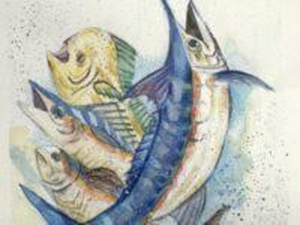
Serena Wang
Blue Marlin | 4th-6th Grade
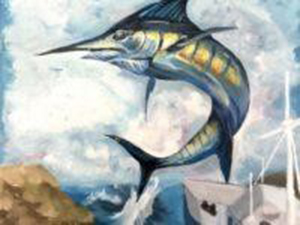
Brooke Linde
Lake Trout | 7th-9th Grade
Podcasts:
All about the Alaska King salmon crisis and solutions / Tom Rowland Podcast
Alaska’s King salmon crisis is only getting worse. Listen in as Tom discusses different solutions with Cody McLaughin, an Alaskan wildlife fanatic who serves on the board of the Alaska Outdoor Council.
Coming Up:
Akwesasne youth fishing event Tuesday the 20th of June at Mallorytown Landing to be hosted by the Mohawk Council of Akwesasne with support from Blue Fish Canada.
Special Guest Feature – IGFA Day is a month-long celebration
International Game Fish Association (IGFA)
Held annually on the International Game Fish Association’s anniversary of June 7th, IGFA Day is a global celebration of recreational anglers and their conservation efforts worldwide. To celebrate, the IGFA is inviting anglers to participate in one of three activities throughout the month of June for a chance to win an IGFA Lifetime Membership, valued up to $2,000:
- Clean Up Your Favorite Fishing Spot: Take the pledge to adopt new Habits for Habitats by cleaning up debris from your favorite fishing spot and properly disposing of it.
- Take IGFA’s Online “Intro to Fishing” Course: Designed for children and novice anglers, this free online course offers an immersive curriculum covering angling basics from fish anatomy to environmental stewardship.
- Go Fishing or Teach Someone to Fish: Connect with the great outdoors and create lasting memories by going fishing or introducing someone new to the sport.
About us:
Subscribe to receive the Blue Fish Canada news in your inbox.
Read back issues of the Blue Fish Canada News
Please rate The Blue fish Radio Show on Apple Podcast.
Email us your news or podcast story ideas.
Donate to Blue Fish Canada, a federally incorporated registered Canadian charity.
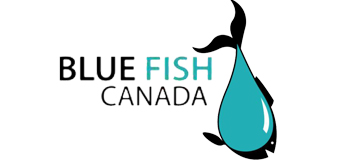 Blue Fish Canada/Poisson Bleu Canada
Blue Fish Canada/Poisson Bleu Canada